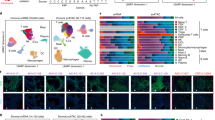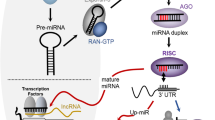Abstract
Adenomatous polyposis coli (APC) mutation is the most common genetic change in sporadic colorectal cancer (CRC). Although deregulations of miRNAs have been frequently reported in this malignancy, APC-regulated miRNAs have not been extensively documented. Here, by using an APC-inducible cell line and array analysis, we identified a total of 26 deregulated miRNAs. Among them, members of miR-17-92 cluster were dramatically inhibited by APC and induced by enforced expression of β-catenin. Furthermore, we demonstrate that activated β-catenin resulted from APC loss binds to and activates the miR-17-92 promoter. Notably, enforced expression of miR-19a overrides APC tumor suppressor activity, and knockdown of miR-19a in cancer cells with compromised APC function reduced their aggressive features in vitro. Finally, we observed that expression of miR-19a significantly correlates with β-catenin levels in colorectal cancer specimens, and it is associated to the aggressive stage of tumor progression. Thus, our study reveals that miR-17-92 cluster is directly regulated by APC/β-catenin pathway and could be a potential therapeutic target in colon cancers with aberrant APC/β-catenin signaling.
This is a preview of subscription content, access via your institution
Access options
Subscribe to this journal
Receive 50 print issues and online access
$259.00 per year
only $5.18 per issue
Buy this article
- Purchase on Springer Link
- Instant access to full article PDF
Prices may be subject to local taxes which are calculated during checkout







Similar content being viewed by others
Change history
20 February 2024
An Editorial Expression of Concern to this paper has been published: https://doi.org/10.1038/s41388-024-02979-5
References
Cunningham D, Atkin W, Lenz HJ, Lynch HT, Minsky B, Nordlinger B et al. Colorectal cancer. Lancet 2010; 375: 1030–1047.
Markowitz SD, Bertagnolli MM . Molecular origins of cancer: molecular basis of colorectal cancer. N Engl J Med 2009; 361: 2449–2460.
Mimori-Kiyosue Y, Matsui C, Sasaki H, Tsukita S . Adenomatous polyposis coli (APC) protein regulates epithelial cell migration and morphogenesis via PDZ domain-based interactions with plasma membranes. Genes Cells 2007; 12: 219–233.
Phelps RA, Broadbent TJ, Stafforini DM, Jones DA . New perspectives on APC control of cell fate and proliferation in colorectal cancer. Cell Cycle 2009; 8: 2549–2556.
Barth AI, Caro-Gonzalez HY, Nelson WJ . Role of adenomatous polyposis coli (APC) and microtubules in directional cell migration and neuronal polarization. Semin Cell Dev Biol 2008; 19: 245–251.
Korinek V, Barker N, Morin PJ, van Wichen D, de Weger R, Kinzler KW et al. Constitutive transcriptional activation by a beta-catenin-Tcf complex in APC-/- colon carcinoma. Science 1997; 275: 1784–1787.
D'Uva G, Bertoni S, Lauriola M, De Carolis S, Pacilli A, D'Anello L et al. Beta-catenin/HuR post-transcriptional machinery governs cancer stem cell features in response to hypoxia. PLoS One 2013; 8: e80742.
Ha NC, Tonozuka T, Stamos JL, Choi HJ, Weis WI . Mechanism of phosphorylation-dependent binding of APC to beta-catenin and its role in beta-catenin degradation. Mol Cell 2004; 15: 511–521.
Rubinfeld B, Albert I, Porfiri E, Fiol C, Munemitsu S, Polakis P . Binding of GSK3beta to the APC-beta-catenin complex and regulation of complex assembly. Science 1996; 272: 1023–1026.
Kudo Y, Kitajima S, Ogawa I, Hiraoka M, Sargolzaei S, Keikhaee MR et al. Invasion and metastasis of oral cancer cells require methylation of E-cadherin and/or degradation of membranous beta-catenin. Clin Cancer Res 2004; 10: 5455–5463.
Pendas-Franco N, García JM, Peña C, Valle N, Pálmer HG, Heinäniemi M et al. DICKKOPF-4 is induced by TCF/beta-catenin and upregulated in human colon cancer, promotes tumour cell invasion and angiogenesis and is repressed by 1alpha,25-dihydroxyvitamin D3. Oncogene 2008; 27: 4467–4477.
Morin PJ, Sparks AB, Korinek V, Barker N, Clevers H, Vogelstein B et al. Activation of beta-catenin-Tcf signaling in colon cancer by mutations in beta-catenin or APC. Science 1997; 275: 1787–1790.
Ambros V . The functions of animal microRNAs. Nature 2004; 431: 350–355.
Kong W, He L, Richards EJ, Challa S, Xu CX, Permuth-Wey J et al. Upregulation of miRNA-155 promotes tumour angiogenesis by targeting VHL and is associated with poor prognosis and triple-negative breast cancer. Oncogene 2014; 33: 679–689.
Bartel DP . MicroRNAs: genomics, biogenesis, mechanism, and function. Cell 2004; 116: 281–297.
Fish JE, Srivastava D . MicroRNAs: opening a new vein in angiogenesis research. Sci Signal 2009; 2: pe1.
Tysnes BB . Tumour-initiating and -propagating cells: cells that we would like to identify and control. Neoplasia 2010; 12: 506–515.
Ueda T, Volinia S, Okumura H, Shimizu M, Taccioli C, Rossi S et al. Relation between microRNA expression and progression and prognosis of gastric cancer: a microRNA expression analysis. Lancet Oncol 2010; 11: 136–146.
Mogilyansky E, Rigoutsos I . The miR-17/92 cluster: a comprehensive update on its genomics, genetics, functions and increasingly important and numerous roles in health and disease. Cell Death Differ 2013; 20: 1603–1614.
Zhou JJ, Zheng S, Sun LF, Zheng L . MicroRNA regulation network in colorectal cancer metastasis. World J Biol Chem 2014; 5: 301–307.
Necela BM, Carr JM, Asmann YW, Thompson EA . Differential expression of microRNAs in tumours from chronically inflamed or genetic (APC(Min/+)) models of colon cancer. PLoS One 2011; 6: e18501.
Zhao JJ, Lin J, Yang H, Kong W, He L, Ma X et al. MicroRNA-221/222 negatively regulates estrogen receptor{alpha} and is associated with tamoxifen resistance in breast cancer. J Biol Chem 2008; 283: 31079–31086.
Yang H, Kong W, He L, Zhao JJ, O'Donnell JD, Wang J et al. MicroRNA expression profiling in human ovarian cancer: miR-214 induces cell survival and cisplatin resistance by targeting PTEN. Cancer Res 2008; 68: 425–433.
Kong W, Yang H, He L, Zhao JJ, Coppola D, Dalton WS et al. MicroRNA-155 is regulated by the transforming growth factor beta/Smad pathway and contributes to epithelial cell plasticity by targeting RhoA. Mol Cell Biol 2008; 28: 6773–6784.
Diosdado B, van de Wiel MA, Terhaar Sive Droste JS, Mongera S, Postma C, Meijerink WJ et al. MiR-17-92 cluster is associated with 13q gain and c-myc expression during colorectal adenoma to adenocarcinoma progression. Br J Cancer 2009; 101: 707–714.
Hart MJ, de los Santos R, Albert IN, Rubinfeld B, Polakis P . Downregulation of beta-catenin by human Axin and its association with the APC tumour suppressor, beta-catenin and GSK3 beta. Curr Biol 1998; 8: 573–581.
van Haaften G, Agami R . Tumourigenicity of the miR-17-92 cluster distilled. Genes Dev 2010; 24: 1–4.
Jiang H, Wang P, Wang Q, Wang B, Mu J, Zhuang X et al. Quantitatively controlling expression of miR-17~92 determines colon tumor progression in a mouse tumor model. Am J Pathol 2014; 184: 1355–1368.
Morin PJ, Vogelstein B, Kinzler KW . Apoptosis and APC in colorectal tumourigenesis. Proc Natl Acad Sci USA 1996; 93: 7950–7954.
Miyazawa K, Iwaya K, Kuroda M, Harada M, Serizawa H, Koyanagi Y et al. Nuclear accumulation of beta-catenin in intestinal-type gastric carcinoma: correlation with early tumour invasion. Virchows Arch 2000; 437: 508–513.
Grillari J, Hackl M, Grillari-Voglauer R . miR-17-92 cluster: ups and downs in cancer and aging. Biogerontology 2010; 11: 501–506.
Lanza G, Ferracin M, Gafà R, Veronese A, Spizzo R, Pichiorri F et al. mRNA/microRNA gene expression profile in microsatellite unstable colorectal cancer. Mol Cancer 2007; 6: 54.
Hong L, Lai M, Chen M, Xie C, Liao R, Kang YJ et al. The miR-17-92 cluster of microRNAs confers tumourigenicity by inhibiting oncogene-induced senescence. Cancer Res 2010; 70: 8547–8557.
Yu G, Tang JQ, Tian ML, Li H, Wang X, Wu T et al. Prognostic values of the miR-17-92 cluster and its paralogs in colon cancer. J Surg Oncol 2012; 106: 232–237.
Luo X, Burwinkel B, Tao S, Brenner H . MicroRNA signatures: novel biomarker for colorectal cancer? Cancer Epidemiol Biomarkers Prev 2011; 20: 1272–1286.
Koga Y, Yasunaga M, Takahashi A, Kuroda J, Moriya Y, Akasu T et al. MicroRNA expression profiling of exfoliated colonocytes isolated from feces for colorectal cancer screening. Cancer Prev Res (Phila) 2010; 3: 1435–1442.
Ng EK, Chong WW, Jin H, Lam EK, Shin VY, Yu J et al. Differential expression of microRNAs in plasma of patients with colorectal cancer: a potential marker for colorectal cancer screening. Gut 2009; 58: 1375–1381.
O'Donnell KA, Wentzel EA, Zeller KI, Dang CV, Mendell JT . c-Myc-regulated microRNAs modulate E2F1 expression. Nature 2005; 435: 839–843.
Mu P, Han YC, Betel D, Yao E, Squatrito M, Ogrodowski P et al. Genetic dissection of the miR-17~92 cluster of microRNAs in Myc-induced B-cell lymphomas. Genes Dev 2009; 23: 2806–2811.
Tetsu O, McCormick F . Beta-catenin regulates expression of cyclin D1 in colon carcinoma cells. Nature 1999; 398: 422–426.
Hulit J, Wang C, Li Z, Albanese C, Rao M, Di Vizio D et al. Cyclin D1 genetic heterozygosity regulates colonic epithelial cell differentiation and tumour number in ApcMin mice. Mol Cell Biol 2004; 24: 7598–7611.
Olive V, Bennett MJ, Walker JC, Ma C, Jiang I, Cordon-Cardo C et al. miR-19 is a key oncogenic component of mir-17-92. Genes Dev 2009; 23: 2839–2849.
Takahashi-Yanaga F, Sasaguri T . Drug development targeting the glycogen synthase kinase-3beta (GSK-3beta)-mediated signal transduction pathway: inhibitors of the Wnt/beta-catenin signaling pathway as novel anticancer drugs. J Pharmacol Sci 2009; 109: 179–183.
Takahashi-Yanaga F, Kahn M . Targeting Wnt signaling: can we safely eradicate cancer stem cells? Clin Cancer Res 2010; 16: 3153–3162.
Lepourcelet M, Chen YN, France DS, Wang H, Crews P, Petersen F et al. Small-molecule antagonists of the oncogenic Tcf/beta-catenin protein complex. Cancer Cell 2004; 5: 91–102.
Song S, Christova T, Perusini S, Alizadeh S, Bao RY, Miller BW et al. Wnt inhibitor screen reveals iron dependence of beta-catenin signaling in cancers. Cancer Res 2011; 71: 7628–7639.
Lindow M, Kauppinen S . Discovering the first microRNA-targeted drug. J Cell Biol 2012; 199: 407–412.
Solmi R, Lauriola M, Francesconi M, Martini D, Voltattorni M, Ceccarelli C et al. Displayed correlation between gene expression profiles and submicroscopic alterations in response to cetuximab, gefitinib and EGF in human colon cancer cell lines. BMC Cancer 2008; 8: 227.
Smyth GK . Linear models and empirical Bayes methods for assessing differential expression in microarray experiments. Stat Appl Genet Mol Biol 2004; 3: Article3.
Shi XB, Xue L, Yang J, Ma AH, Zhao J, Xu M et al. An androgen-regulated miRNA suppresses Bak1 expression and induces androgen-independent growth of prostate cancer cells. Proc Natl Acad Sci USA 2007; 104: 19983–19988.
Acknowledgements
We are grateful for the Molecular Biology and Analytic Microscopy Core and Tissue Core facilities at H. Lee Moffitt Cancer Center. We also thank Dr Thomas Ried for providing NCI-H508 cell line. This work was supported in part by CA137041, CA160455 (JQC) and the Moffitt Cancer Center Foundation. The H. Lee Moffitt Cancer Center & Research Institute is supported in part by NCI Cancer Center Support Grant #P30 CA076292. ML was supported by ‘Fondazione del Monte di Bologna e di Ravenna’ (Bologna, Italy).
Author information
Authors and Affiliations
Corresponding authors
Ethics declarations
Competing interests
The authors declare no conflict of interest.
Additional information
Supplementary Information accompanies this paper on the Oncogene website
Supplementary information
Rights and permissions
About this article
Cite this article
Li, Y., Lauriola, M., Kim, D. et al. Adenomatous polyposis coli (APC) regulates miR17-92 cluster through β-catenin pathway in colorectal cancer. Oncogene 35, 4558–4568 (2016). https://doi.org/10.1038/onc.2015.522
Received:
Revised:
Accepted:
Published:
Issue Date:
DOI: https://doi.org/10.1038/onc.2015.522



